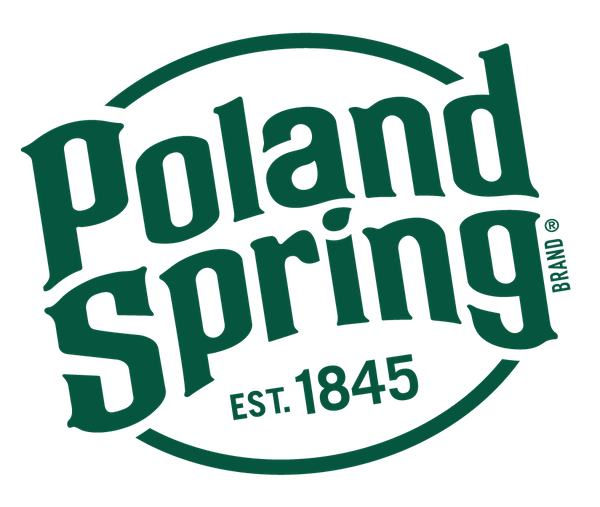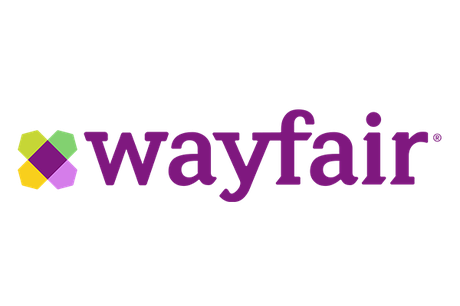2022–23 Education Impact Report: Empowering our Next Generation of Climate Scientists
Reports | Jan 25, 2024
Our education team strives to inform and inspire the next generation of climate scientists by engaging students in authentic science and supporting educators working to do the same. By helping students develop and deepen confidence, competence, and curiosity in science, we aim to position them as lifelong learners who will support healthy ocean ecosystems, sustainable seafood practices, and the blue economy workforce.
Read on to see some of the ways our education team made an impact across the state and beyond in the 2022 – 2023 school year.

The 2022 – 2023 school year came with reinvigorated energy and enthusiasm around science learning. After experiencing the uncertainty and challenges of schooling during the pandemic, students and educators alike were eager to feel connected — to their work, peers, ecosystems, and the scientific community. Through immersive science learning experiences, GMRI develops and deepens these connections to help inspire our next generation of STEM (science, technology, engineering, and mathematics) leaders and decision makers.
We’re thrilled to share more about the results and impact of our education work in the 2022 – 2023 school year.
Numbers at a Glance
When you zoom out, it's easy to see the broad impact our education team has on students and educators in our region.
Students engaged
Across our education programs, we supported STEM learning for thousands of students.
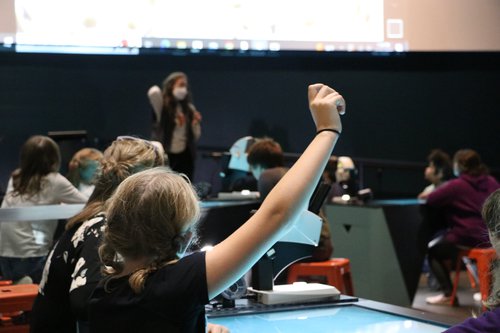
Educators supported
Ensuring that educators have the resources, curriculum, and connections they need is a top priority of our education team.

School and Organizational Partners
Our work supports schools and organizations, spanning formal (classroom) and informal (community) educators — reaching students in every step of their learning pathways.

LabVenture
LabVenture remains our tried-and-true immersive experience designed to kickstart students' STEM learning journey. Once students step foot into our learning laboratory, they become scientists examining real data and answering real questions including: how is the Gulf of Maine changing? How are species responding? What do these changes mean for our region’s ecosystems, economies, and communities?
In the 2022 – 2023 school year, we proudly reached 8,300 students with LabVenture. Whether students joined us from down the street or up in the county, they traveled aboard our GMRI branded coach buses. This transportation — which is offered at no cost to public school students — is critical to ensure that every student in Maine, regardless of their resources, has access to transformative STEM learning. For some of the students we reached in the 2022 – 2023 school year, their LabVenture visit was their first field trip in years (or ever!) or their first time seeing the ocean.
2022 – 2023 LabVenture Service Map
A map of the state of Maine with orange dots placed throughout.
LabVenture Numbers at a Glance
Students engaged
In the 2022-23 school year, we supported STEM learning for a diverse range of students across the state of Maine for free.

Increased Access
Almost half of the students who experienced LabVenture for free in the 2022-23 school year came from low-to-moderate income households.

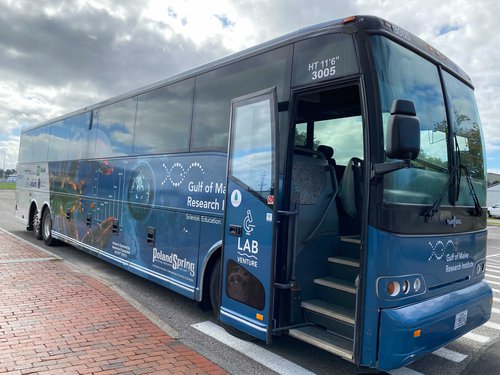
Counties served
The LabVenture learning experience reaches students from all of Maine's 16 counties.

Professional Development
We developed and delivered professional development to 55 educators that help them take lessons from LabVenture back to their classrooms.
"We learned many things during our experience at GMRI, we covered topics about black sea bass, plankton, and lobsters. We even got to hold these majestic creatures and learn about how these animals affect our ecosystem. We are so glad to have experienced such a cool field trip to the coast.
Lya, Aubrey, Autumn, and Paige Students from Franklin County
"We especially enjoy this program for the opportunities it provides to students to see real science at work. They also see that there are science careers available for them in their home state. Having the financial aspect of the trip covered through your generosity is what allows us to incorporate this trip into our students’ sixth grade experience.
Ms. Hopkins Educator, Kennebec County
Statewide LabVenture Supporter
Poland Spring is a statewide partner in delivering LabVenture through their Good Neighbor grant program. Poland Spring supports GMRI to help foster the next generation of water stewards.
See appendix for full list of LabVenture supporters.
Community Science: Investigating Local Ecosystems
In order for science learning to have meaningful, lasting impacts, we must help make the fundamental STEM skills (such as those developed in LabVenture) relevant to the world around them. Community science does just that by leading students through immersive investigations of local ecosystems, exploring the vernal pools, intertidal zones, and forests in their backyards and schoolyards. Through our community science curriculum at GMRI, students not only collect data but also contribute their findings to real, ongoing research projects led by expert scientists via our Ecosystem Investigation Network.
This authentic approach helps students build confidence and agency which is particularly critical as they navigate the overwhelming challenges brought by climate change. Through community science, students connect to their immediate surroundings and the broader community working to understand and mitigate climate impacts. By focusing on local impacts, students are directly involved in understanding ecosystem change and advancing solutions rather than being paralyzed by helplessness. These youth-driven climate solutions are perfectly illustrated by a group of students from Old Orchard Beach working to eliminate an invasive pest from their local forest. After using our community science protocol to determine the presence of hemlock woolly adelgid (an invasive woodland pest), students raised funds to execute a solution, published a research article in our Findings from the Field journal detailing their plan, and are now working with a state entomologist to control the adelgid with predator beetles. They are also tracking the success of the biological control by closely assessing adelgid and beetle populations.
Community Science Numbers at a Glance
Students engaged
We reached over 5,000 students in their communities to ensure they can conduct scientific inquiries around the ecosystems that matter to them.

Classrooms supported
We provided community science oriented curriculum to classrooms throughout Maine and beyond — from the coast to the forests.


Data points collected
Whether it was counting invasive green crabs, hemlock woolly adelgids, or data from another project, students collected an impressive amount of data.
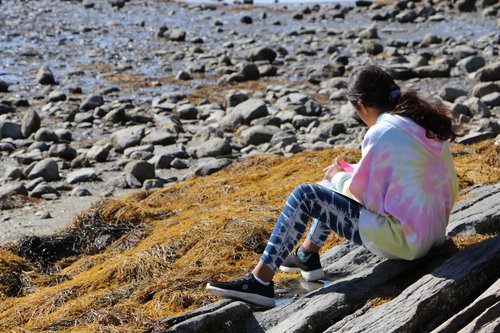
Making a difference
Nearly all students surveyed reported feeling like they were making a difference in their local environments by participating in community science efforts.
In addition to the student reach, we also engaged 150 educators through professional development workshops, online information sessions, and field training sessions designed to help them create and lead hands-on science experiences for students in their classrooms. This program growth can be attributed in part to continued development of our community science challenge model, utilized for vernal pool investigations among other projects, which strives to build a sense of community through synchronous participation, weekly updates, and multiple guided conversations among participating schools.
When we asked students about their favorite part of their community science experiences, they shared these reflections:
"I liked knowing that there were lots of other people working on the same thing.
"I enjoyed being able to go outside and figure out answers that no one else knew.
Findings from the Field
Finding from the Field (“Findings”) is Maine’s first and only scientific journal for and by middle school students, engaging them in the communication of scientific inquiries through writing and peer review. Findings empowers students to explore the topics that interest them most and gain authentic experience in mindfully consuming information, communicating clearly, and giving and incorporating constructive feedback.
In the 2022-2023 school year, we engaged approximately 1,700 students in Findings across the writing, review, and publication process. Findings: Volume 6 features 23 student publications in three different formats — full research articles, nature notes (student observations of the natural world), and data challenges (analysis of data collected during community science investigation). These published scholars represent eight schools across Maine and New Hampshire, including some that participate in Findings year after year. Since publication of volume 6 in spring 2023, there have been more than 600 downloads of students’ findings across the globe, demonstrating the value of student scientists and their work.
Findings from the Field Numbers at a Glance
Students engaged
Students work together to conduct, reflect on, and share scientific investigations in a peer-reviewed science journal.

Student publications
Student contributions to the journal undergo a process of peer and editorial board review before publication.


Participating schools
Students from eight schools became scientists, conducting and writing about real-world research.

Educators supported
Our education team provided professional development opportunities for educators looking to connect their students to authentic scientific work.
An Educator's Experience with Findings
As I was teaching my 5th graders about the Hemlock Woolly Adelgid this year I realized that the Findings from the Field articles could be a great resource for my students. I've always wanted a way to introduce students to the scientific article format, but generally scientific articles are written at a really high reading level. Since "Findings" articles are written by middle schoolers they are much more accessible. They also show the relevance of what we are studying — reading these articles written by other students both from our school and other schools shows that this is an issue that matters in our town and in our state. It was also really cool for my students to realize that some of these articles were written by older students who they actually know from town, or in one case, an older sibling had co-written one of the articles. Findings articles have the right kind of information, written at the right reading level, and show students where they might go as they pursue science.
By engaging students in robust science learning, we can equip and activate them as critical thinkers and decision makers who will ultimately advance solutions to the most pressing challenges of our time, including adapting to climate change and protecting ocean ecosystems. At GMRI, we’re proud to play a role in energizing future generations of scientists and STEM leaders and are deeply appreciative to the partners who make this work possible, including classroom teachers, informal educators, community organizations, and of course, our donors and supporters.
Appendix: Supporters
General Education
- Ash Tree Fund
- Morton Kelly Charitable Trust
- Schiavi Family Foundation
LabVenture
- Poland Spring
- Edwin S. Webster Foundation
- Wayfair
- Tom's of Maine
- Abbott Diagnostics Scarborough, Inc.
- Alfred M. Senter Fund
- Arlene Briard
- Bangor Savings Bank
- Bank of America Charitable Foundation
- Bath Iron Works
- Bath Savings Institution
- Charles C. Butt
- Cianbro Charitable Foundation
- Clark Insurance
- George P. Davenport Trust Fund
- Harold H. Dudley Charitable Fund
- Hyman Family Foundation
- Katahdin Trust Company
- Kennebunk Savings Bank
- Kleinschmidt Group
- LL Bean
- M&T Bank
- Machias Savings Bank
- Marr-Anderson Family Foundation
- MMG Insurance Company
- Norway Savings Bank
- Old Bug Light Charitable Foundation
- onsemi
- Phineas W. Sprague Memorial Foundation
- Pond Family Foundation
- Portland Pipe Line Corporation
- R.H. Reny’s, Inc.
- Reny Charitable Foundation
- RBC Wealth Management, USA
- Robert G. & Jane V. Engel Foundation
- Saco & Biddeford Savings Institution
- Seth Sprague Educational and Charitable Foundation
- Skowhegan Savings Bank
- TD Charitable Foundation
- WesaDoe Fund
We also work closely with a team of committed partners and vendors who are critical in executing our program: Cyr Bus Lines, Custom Coach, and Upswell.
- Statewide Supporter
- Lead Supporters
- Additional Supporters
Community Science
- The Onion Foundation
- Kettering Family Foundation
- Robert and Dorothy Goldberg Charitable Trust
- Margaret E. Burnham Charitable Trust
Findings from the Field
- Dorr Foundation
- Unum
- Davis Family Foundation
Read More
-
![Vernal Pool Spring Blitz]()
Vernal Pool Spring Blitz
During peak vernal pool season this spring, our Education team is offering virtual and in-person learning experiences focused on bringing young people and educators together …
Tidings
-
![Educator Extravaganza]()
Educator Extravaganza
Our Education team designed and led a jam-packed week of professional development opportunities for dozens of Maine educators.
Tidings
-
![Hands-on With Future Fisheries]()
Hands-on With Future Fisheries
We hosted a unique workshop on management strategy evaluation (MSE) this June, designed for fishermen and fisheries stakeholders.
Tidings
-
![Building a Healthy Blue Economy Workforce]()
Building a Healthy Blue Economy Workforce
A vital workforce is central to a thriving blue economy. By equipping more people with the necessary skills to enter and succeed in that workforce, …
Perspectives
